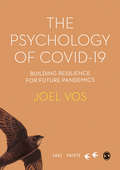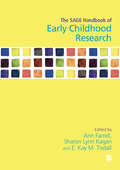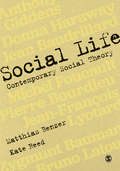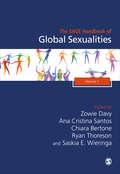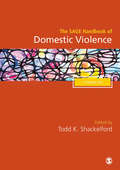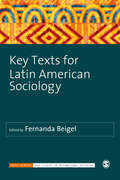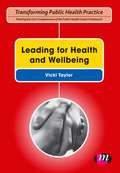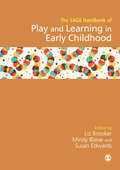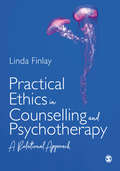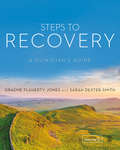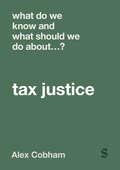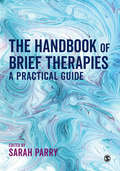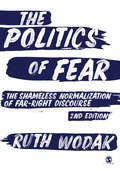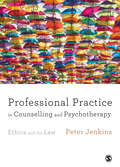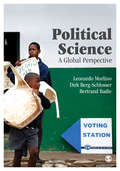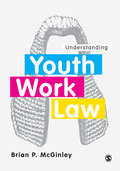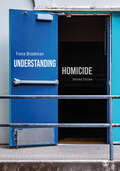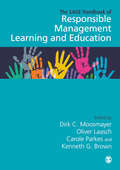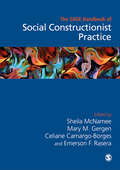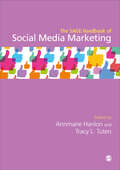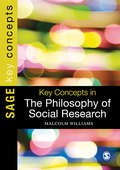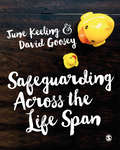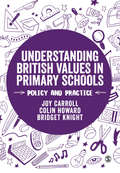- Table View
- List View
The Psychology of Covid-19: Building Resilience for Future Pandemics (SAGE Swifts)
by Joel VosThe Psychology of Covid-19 explores how the coronavirus is giving rise to a new order in our personal lives, societies and politics. Rooted in systematic research on Covid-19 and previous pandemics, including SARS, Ebola, HIV and the Spanish Flu, this book describes how Covid-19 has impacted a broad range of domains, including self-perception, lifestyle, politics, mental health, media, and meaning in life. Building on this, the book then sets out how we can improve our psychological and social resilience, to safeguard ourselves against the psychological effects of future pandemics.
The SAGE Handbook of Early Childhood Research
by E. Kay M. Tisdall Ann Farrell Sharon Lynn KaganRecent decades have seen an upsurge of research with and about young children, their families and communities. The Handbook of Early Childhood Research will provide a landmark overview of the field of early childhood research and will set an agenda for early childhood research into the future. It includes 31 chapters provided by internationally recognized experts in early childhood research. The team of international contributors apply their expertise to conceptual and methodological issues in research and to relevant fields of practice and policy. The Handbook recognizes the main contexts of early childhood research: home and family contexts; out-of-home contexts such as services for young children and their families; and broader societal contexts of that evoke risk for young children. The Handbook includes sections on: the field of early childhood research and its key contributions new theories and theoretical approaches in early childhood research collecting and analysing data applications of early childhood research This Handbook will become the valuable reference text for students, practitioners and researchers from across the social sciences and beyond who are engaged in research with young children.
Social Life: Contemporary Social Theory
by Kate Reed Matthias BenzerIn Social Life, the authors highlight, explain, and scrutinize socio-theoretical analyses of contemporary social relations and conditions - put forward by eight modern social theorists - and analyse how these have informed sociological inquiries into people’s lives in today’s social world. The book discusses the works of the following social theorists: Anthony Giddens Pierre Bourdieu Bruno Latour Donna Haraway Zygmunt Bauman Jean-Francois Lyotard Michel Foucault Jean Baudrillard In each chapter, the authors identify the key components of each theorist’s conception of society and apply the theories outlined to specific, modern phenomena. This connection with modern-day phenomena allows for a critical interrogation of issues in contemporary society, including: Inequality and Capital, Power, Fear and Terrorism, Immune System Discourse, Suffering, and Climate Change. Essential reading for all sociology students studying social theory and the works of modern social theorists.
The SAGE Handbook of Global Sexualities
by Ana Cristina Santos Saskia E. Wieringa Zowie Davy Chiara Bertone Ryan ThoresonThis two-volume Handbook provides a major thematic overview of global sexualities, spanning each of the continents, and its study, which is both reflective and prospective, and includes traditional approaches and emerging themes. The Handbook offers a robust theoretical underpinning and critical outlook on current global, glocal, and ‘new’ sexualities and practices, whilst offering an extensive reflection on current challenges and future directions of the field. The broad coverage of topics engages with a range of theories, and maintains a multi-disciplinary framework. PART ONE: Understanding Sexuality: Epistemologies/Conceptual and Methodological Challenges PART TWO: Enforcing and Challenging Sexual Norms PART THREE: Interrogating/Undoing Sexual Categories PART FOUR: Enhancement Practices and Sexual Markets/Industries PART FIVE: Sexual Rights and Citizenship (And the Governance of Sexuality) PART SIX: Sexuality and Social Movements PART SEVEN: Language and Cultural Representation
The SAGE Handbook of Domestic Violence
by Todd K. ShackelfordThe field of Domestic Violence research has expanded considerably in the past decade and now includes work conducted by researchers in many different disciplines, notably political science, public health, law, psychology, sociology, criminology, anthropology, family studies, and medicine. The SAGE Handbook of Domestic Violence provides a rich overview of the most important theoretical and empirical work in the field, organized by relationship type. The handbook addresses three major areas of research on domestic violence: - Violence against partners - Violence against children - Violence against other family members. This Handbook is a unique and timely publication and a long awaited, valuable resource for the vast amount of Domestic Violence research centres and individual researchers across the globe.
Key Texts for Latin American Sociology (SAGE Studies in International Sociology)
by Fernanda BeigelKey Texts for Latin American Sociology is the first book to curate and translate into English key texts from the Latin American Sociological canon. By bringing together texts from leading sociologists in Argentina, Brazil, Peru, Chile, Costa Rica, Mexico, Bolivia, and Uruguay, the book provides comprehensive coverage of a wide range of issues in Latin American Sociology; drawing attention to embedded issues such as inequalities, identities, development, oppression and representation. This volume is the result of five years of collaboration between colleagues from 15 Latin American Countries, coordinated by Fernanda Beigel (CONICET, UNCuyo, Mendoza-Argentina) with the collaboration of the ′Key Texts Scientific Committee′, the Committee consists of the following members: Nadya Araujo Guimaraes (PPGS-USP, Brazil), Manuel Antonio Garretón (Universidad de Chile), Raquel Sosa Elizaga (CELA-UNAM, México), Jorge Rovira Mas (Universidad de Costa Rica), Breno Bringel (IESP-UERJ, Brazil), Joao Ehlert Maia (FGV, Brazil), Hebe Vessuri (IVIC, Venezuela), André Bothelo (UFRJ, Brazil), Carlos Ruiz Encina (Universidad de Chile), Eloisa Martin (UFRJ, Brazil), Sergio Miceli (PPGS- USP, Brazil), Alejandro Moreano (UCE, Ecuador), Elizabeth Jelin (CONICET-IDES, Argentina), Patricia Funes (UBA-CONICET, Argentina), Claudio Pinheiro (FGV, Brazil), Pablo de Marinis (UBA, CONICET, Argentina), Diego Pereyra (UBA, CONICET, Argentina), José Gandarilla Salgado (CIICH-UNAM, México), Juan Piovani (UNLP-CONICET, Argentina).
Leading for Health and Wellbeing (Transforming Public Health Practice Series)
by Vicki Taylor′Building on the core competences for public health, this book focuses on the key areas of leadership and collaborative working to improve health and wellbeing. Aimed at those undertaking Masters courses in public health and health promotion, (as well as those seeking to gain public health registration through the compilation and submission of a portfolio) this book focuses on leadership and collaborative working to improve health and wellbeing. Leadership, building alliances, developing capacity and capability, working in partnership with other practitioners, agencies and communities, understanding different organisational stuctures and cultures and working effectively across organisational boundaries are central themes throughout this book. Leadership skills such as negotiation, persuasion and influencing and the nature of power and the importance of understanding one′s self and the communication process and project management skills and leading and managing change to improve health and wellbeing are considered. Case studies, activities and research summaries are used throughout the book to help the reader to understand how to apply the theory to practice.
SAGE Handbook of Play and Learning in Early Childhood
by Susan Edwards Mindy Blaise Liz Brooker′This Handbook offers diverse perspectives from scholars across the globe who help us see play in new ways. At the same time the basic nature of play gives a context for us to learn new theoretical frameworks and methods. A real gem!′ - Beth Graue, Department of Curriculum and Instruction, Wisconsin Center for Education Research, USA Play and learning scholarship has developed considerably over the last decade, as has the recognition of its importance to children’s learning and development. Containing chapters from highly respected researchers, whose work has been critical to building knowledge and expertise in the field, this Handbook focuses on examining historical, current and future research issues in play and learning scholarship. Organized into three sections which consider: theoretical and philosophical perspectives on play and learning play in pedagogy, curriculum and assessment play contexts. The Handbook′s breadth, clarity and rigor will make it essential reading for researchers and postgraduate students, as well as professionals with interest in this dynamic and changing field. Liz Brooker is Reader in Early Childhood in the Faculty of Children and Learning at the Institute of Education, University of London. Mindy Blaise is an Associate Professor of Early Childhood Education in the Department of Early Childhood Education at the Hong Kong Institute of Education. Susan Edwards is Associate Professor in Curriculum and Pedagogy at Australian Catholic University. This handbook′s International Advisory Board included: Jo Aliwood, The University of Newcastle, Australia Pat Broadhead, Leeds Metropolitan University, Australia Stig Brostrom, Aarhus University, Denmark Hasina Ebrahim, University of the Free State, South Africa Beth Graue, Wisconsin Center for Education Research, USA Amita Gupta, The City College of New York, CUNY, USA Marjatta Kalliala, University of Helsinki, Finland Rebecca Kantor, University of Colorado Denver, USA Colette Murphy, Trinity College, Dublin, Republic of Ireland Ellen Sandseter, Queen Maud University College of Early Childhood Education, Norway
Practical Ethics in Counselling and Psychotherapy: A Relational Approach
by Linda FinlayAre you sometimes challenged by how to apply ethical principles in your own practice? Looking to understand what ethical practice can look like from different theoretical standpoints? Linda Finlay takes you on an exploration of ethical therapeutic practice. She highlights how therapeutic decisions depend on the social and relational context and vary according to your theoretical lens. She provides you with guidance on how to engage in therapy relationally while remaining professional, ethical and evidence-based. Split over three parts this book takes you through: - The Context of Relational Ethics - introducing you to the foundational ideas, and considering how professional codes are applied within therapy - Relational Ethics within the Therapeutic Relationship – exploring the complex judgements demanded by the therapeutic process, and looking at how therapy needs to be situation specific - Relational Ethics in Practice – five extended, fictional case studies demonstrate relational ethics in practice, and discuss the issues raised.
The Psychology of Covid-19: Building Resilience for Future Pandemics (SAGE Swifts)
by Joel VosThe Psychology of Covid-19 explores how the coronavirus is giving rise to a new order in our personal lives, societies and politics. Rooted in systematic research on Covid-19 and previous pandemics, including SARS, Ebola, HIV and the Spanish Flu, this book describes how Covid-19 has impacted a broad range of domains, including self-perception, lifestyle, politics, mental health, media, and meaning in life. Building on this, the book then sets out how we can improve our psychological and social resilience, to safeguard ourselves against the psychological effects of future pandemics.
Steps to Recovery: A clinician′s guide
by Graeme Flaherty-Jones Sarah Dexter-SmithWith each chapter representing a session, this engaging book is a guide to working collaboratively with individuals and incorporating recovery principles into your therapeutic practice. Incorporating both philosophical and theoretical background, the authors guide the reader through each session with highlights of what to do when, key points for thought, and notes of caution. With access to downloadable worksheets to use with clients in session, as well as crib sheets to help keep you on track, you will have everything you need to confidently help people on their recovery journey.
What Do We Know and What Should We Do About Tax Justice? (What Do We Know and What Should We Do About:)
by Alex CobhamThis book lays out what we know about the scale, history and impacts of tax abuse. From profit-shifting by multinational corporations to the exploitation of offshore tax havens. It sheds light on the people and organisations that enable tax abuse, and the stark social inequalities it creates. Crucially, it also explores what we can do about it. What are the practical realities of challenging the threats of tax injustice and of holding abusers accountable? What are the policies and institutional shifts we need to see and fight for? It is estimated that cross-border tax abuse accounts for around half a trillion dollars of lost revenue around the world each year. This is important. Alex Cobham shows us that tax is more than just business regulation or economic policy. It is a powerful tool for creating a fair and just society. It is our social superpower. Alex Cobham is an economist and chief executive of Tax Justice Network. Written by leading social scientists, the What Do We Know and What Should We Do About...? series offers concise, up-to-date overviews of issues often oversimplified, misrepresented or misunderstood and shows you how to enact change. "Short, sharp and compelling." - Alex Preston, The Observer "If you want to learn a lot about what matters most, in as short a time as possible, this is the series for you."- Danny Dorling, 1971 Professor of Geography, University of Oxford
The Handbook of Brief Therapies: A practical guide
by Sarah ParryThis step-by-step guidebook offers a range of contemporary and popular brief treatments, suitable for a range of client groups and professional settings. Following a comprehensive introduction to the use of brief interventions in therapeutic practice, each chapter provides an introduction to the theoretical underpinnings and evidence-based brief intervention, followed by guidance on how to implement the approaches with useful ′top tips′, worksheets and examples from practice through case vignettes illustrating its application. The Handbook reflects current recommendations and guidelines of the National Institute for Health and Care Excellence and recommendations of accrediting professional bodies in the UK and US. A must have for any practitioner working to support the wellbeing of others.
The Politics of Fear: The Shameless Normalization of Far-Right Discourse
by Ruth WodakFar-right populist politics have arrived in the mainstream. We are now witnessing the shameless normalization of a political discourse built around nationalism, xenophobia, racism, sexism, antisemitism and Islamophobia. But what does this change mean? What caused it? And how does far-right populist discourse work? The Politics of Fear traces the trajectory of far-right politics from the margins of the political landscape to its very centre. It explores the social and historical mechanisms at play, and expertly ties these to the "micro-politics" of far-right language and discourse. From speeches to cartoons to social media posts, Ruth Wodak systematically analyzes the texts and images used by these groups, laying bare the strategies, rhetoric and half-truths the far-right employ. The revised second edition of this best-selling book includes: A range of vignettes analyzing specific instances of far-right discourse in detail. Expanded discussion of the "normalization" of far-right discourse. A new chapter exploring the challenges to liberal democracy. An updated glossary of far-right parties and movements. More discussion of the impact of social media on the rise of the far-right. Critical, analytical and impassioned, The Politics of Fear is essential reading for anyone looking to understand how far-right and populist politics have moved into the mainstream, and what we can do about it.
Professional Practice in Counselling and Psychotherapy: Ethics and the Law
by Peter JenkinsDeveloping and maintaining a secure framework for professional practice is a core part of any counselling and psychotherapy training, as all therapists need to understand the key values, ethics and laws that underpin the profession today. But what does being a member of a ′profession’ actually mean, and what does being a ‘professional’ actually involve? Structured around the BACP Core Curriculum, and with the help of exercises, case studies and tips for further reading, this book covers everything from the requirements of the BACP Ethical Framework to broader perspectives on good professional practice. It includes: Practising as a therapist in different roles and organizational contexts. Working with key issues, including difference, vulnerable clients and risk. Understanding the law and relevant legal frameworks for practice. Working ethically, including contrasting models and approaches to ethics.
Political Science: A Global Perspective (The\world Of Political Science)
by Dirk Berg-Schlosser Bertrand Badie Leonardo A. MorlinoFrom the award-winning team behind the International Encyclopaedia of Political Science... Moving beyond mainstream "traditional" approaches to bring you a new advanced-level introduction to political science. A perfect introduction for postgraduates who are new to political science, as well as upper-level undergraduates looking to broaden and deepen their understanding of core topics, this progressive account: Guides you through all key areas of political science: origins, methodological foundations, key topics, and current issues Takes an international and pluralist perspective with all issues explored in a comparative way related to different cultural and historical contexts Includes pulled-out descriptions of major concepts, further reading and self-assessment questions at the end of each chapter.
Understanding Youth Work Law
by Brian P. McGinleyUnderstanding the law is now a more important part of youth work practice than ever before, and all successful youth work professionals need to understand the way that law and policy supports good ethical practice. This book provides a coherent overview of the legal processes and requirements encountered by today’s youth work professionals, helping readers learn how to make informed ethical judgements and offer appropriate advice to young people. It offers an insight into how laws are made, explains major legal requirements for safe youth work practice and details a range of guidance on the current frameworks and legislation students and practitioners need to be aware of. Using real world scenarios, case studies, and reflective questions, it helps the reader to engage critically with the current legal context of youth work, and develop their thinking, skills and practice. This is essential reading for all students working towards professional recognition in work with young people.
Understanding Homicide
by Fiona BrookmanIn this engaging and accessible book, Brookman draws upon several decades of her own research on homicide and violence, including ethnographic research on homicide investigation in the UK and USA and interviews with violent offenders, in order to unravel the characteristics and causes of homicide, how police and forensic scientists investigate it and how it can be prevented. Synthesising bespoke new analysis of the Home Office Homicide Index with case studies of homicides and international debate and literature, this comprehensive textbook will be a valuable resource for students studying homicide, violence, its investigation and responses to it, as well as researchers and practitioners interested in homicide and violence.
The SAGE Handbook of Responsible Management Learning and Education
by Kenneth G. Brown Oliver Laasch Carole Parkes Dirk MoosmayerReflecting the rapid rise in popularity of recent initiatives such as the UN Principles for Responsible Management Education (PRME), this handbook exhaustively covers a variety of responsible management, learning and education topics, and provides an invaluable roadmap for this fast-developing field. Covering various perspectives on the topic, right through to contexts, methods, outcomes and beyond, this volume will be an invaluable integrative resource for practitioners and researchers alike, and is designed to serve a range of communities that deal with topics related to sustainability, responsibility and ethics in management learning and education.
The Sage Handbook of Social Constructionist Practice
by Mary M. Gergen Sheila McNamee Celiane Camargo-Borges Emerson F. RaseraThe SAGE Handbook of Social Constructionist Practice is the first major survey of innovations in professional practice emerging from a social constructionist orientation to social science. This key perspective has been unique in its stimulation of pioneering practices over a broad number of professions. This volume offers insights into the latest developments in theory, showcases the range and variations in practical outcomes, while pointing to emerging directions of development. The Handbook focuses on hands-on practices, while offering the theoretical tools for further enriching their application. The authors are leading figures in their fields, including organizational development, therapy, healthcare, education, research, and community building. The volume will be particularly useful for students, scholars, professional practitioners, and change makers from across the globe. PART ONE: Introduction PART TWO: Research Practices PART THREE: Practices in Therapeutic Professions PART FOUR: Practices in Organizational Development PART FIVE: Practices in Education PART SIX: Practices in Healthcare PART SEVEN: Community Practices
The Sage Handbook of Social Constructionist Practice
by Mary M. Gergen Sheila McNamee Celiane Camargo-Borges Emerson F. RaseraThe SAGE Handbook of Social Constructionist Practice is the first major survey of innovations in professional practice emerging from a social constructionist orientation to social science. This key perspective has been unique in its stimulation of pioneering practices over a broad number of professions. This volume offers insights into the latest developments in theory, showcases the range and variations in practical outcomes, while pointing to emerging directions of development. The Handbook focuses on hands-on practices, while offering the theoretical tools for further enriching their application. The authors are leading figures in their fields, including organizational development, therapy, healthcare, education, research, and community building. The volume will be particularly useful for students, scholars, professional practitioners, and change makers from across the globe. PART ONE: Introduction PART TWO: Research Practices PART THREE: Practices in Therapeutic Professions PART FOUR: Practices in Organizational Development PART FIVE: Practices in Education PART SIX: Practices in Healthcare PART SEVEN: Community Practices
The SAGE Handbook of Social Media Marketing
by Annmarie Hanlon Tracy L. TutenSocial media marketing has become indispensable for marketers who utilize social media to achieve marketing objectives ranging from customer care to advertising to commerce. This Handbook explores the foundations and methodologies in analysing the important aspects of social media for organisations and consumers. It investigates critical areas concerning communities, culture, communication and content, and considers social media sales. This Handbook brings together the critical factors in social media marketing as the essential reference set for researchers in this area of continued growth. It is essential reading for postgraduate students, researchers, and practitioners in a range of disciplines exploring the area. Part 1: Foundations of Social Media Marketing Part 2: Methodologies and Theories in Social Media Part 3: Channels and Platforms in Social Media Part 4: Tools, Tactics, and Techniques in Social Media Marketing Part 5: Management and Metrics in Social Media Part 6: Ethical Issues in Social Media
Key Concepts in the Philosophy of Social Research (SAGE Key Concepts series)
by Malcolm Williams"This is a splendid book, providing a readable and reliable guide to a very large range of topics and literature... the author brings together, as few of us can, the details of research methodology and practice with broader philosophical perspectives and approaches." - William Outhwaite, Emeritus Professor, Newcastle University "We need researchers who are philosophically informed rather than philosophically obsessed or philosophically oppressed. With this book Malcolm Williams strikes the exact balance." - Ray Pawson, Emeritus Professor, University of Leeds This book is an ideal introduction for any student or social researcher hoping to better understand the philosophical issues that inform social research. Williams is the perfect guide providing short focused introductions to key concepts alongside a persuasive and engaging overview of how we interpret and conduct research. The book covers everything from core research methods, to ethical concerns and an exploration of the metaphysics of social life, with each entry providing: Clear definitions Engaging real world examples Up-do-date suggestions for further reading Informative cross-referencing Lists of key thinkers. Relevant and authoritative, this book is an indispensable introduction to the philosophy of social research.
Safeguarding Across the Life Span
by June Keeling David GooseyConsidering safeguarding across the life span and placing it within a multiagency context, this book gives students a grounding to the key issues in safeguarding today, highlighting the key skills and knowledge necessary for effective practice along the way. It includes reference to the latest legislation, skills for practice, a breadth of contexts and service-user groups, drawing on a range of case studies, activities, reflective questions and recommending reading from across health and social care. Locating age specific concerns in context and divided into sections which cover every stage of life, it addresses questions of culture, gender and problems frequently encountered in practice and what these mean for safeguarding and law.
Understanding British Values in Primary Schools: Policy and practice (Transforming Primary QTS Series)
by Joy Carroll Colin Howard Bridget KnightSchools must actively promote the fundamental British values of democracy, the rule of law, individual liberty, mutual respect and tolerance of those with different faiths and beliefs. The Teachers′ Standards make it clear that teachers themselves must do nothing to undermine these fundamental British Values. So how do schools and teachers provide educational experiences for primary aged children that explore and promote these values? This text provides trainees, teachers and schools with practice-based advice, informed by current practitioners, relating to the delivery of ‘British Values′. The content covers many topical themes and provides a unique insight into delivering ‘British Values’ in schools. It supports educational professionals to understand their duties around the PREVENT agenda and goes further to explore why this is important. It helps trainees and teachers to see how these ′values′ fit within the wider context of education and what we value as educators.
